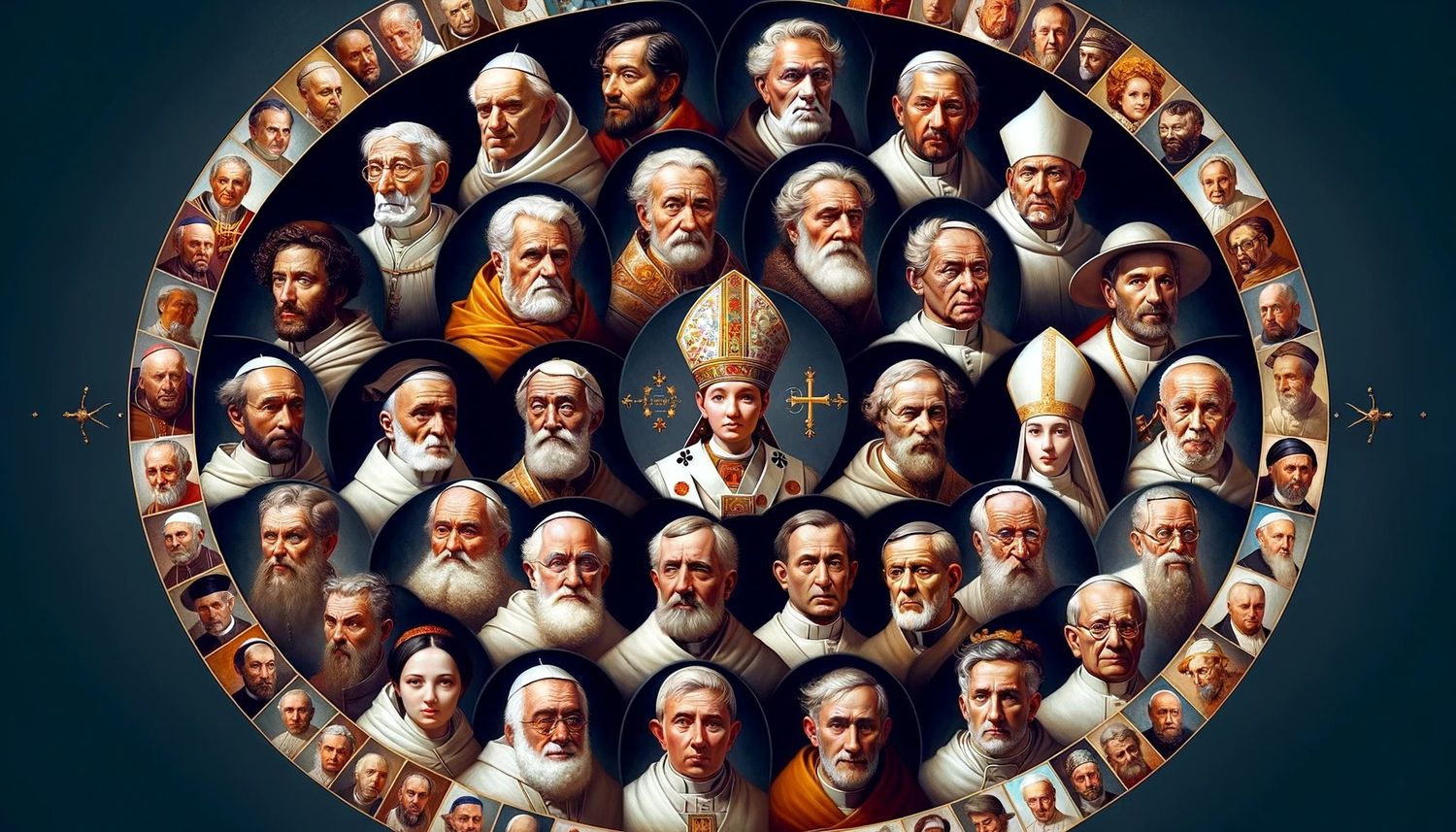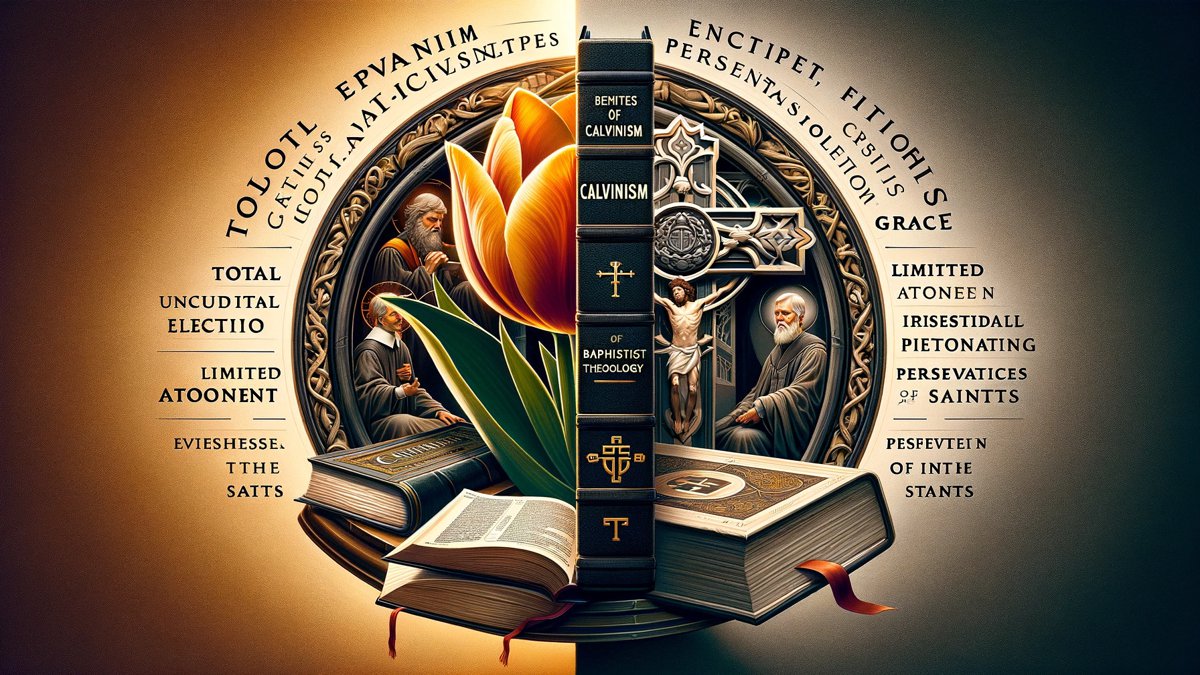Home>Theology and Spirituality>What Is One Thing Catholicism, Lutheranism, And Calvinism Have In Common?


Theology and Spirituality
What Is One Thing Catholicism, Lutheranism, And Calvinism Have In Common?
Published: February 17, 2024
Peter Smith, Editorial Director at Christian.net, combines deep insights into faith, politics, and culture to lead content creation that resonates widely. Awarded for his contributions to religious discourse, he previously headed a major organization for religious communicators, enhancing dialogue on faith's societal impacts.
Discover the common thread between Catholicism, Lutheranism, and Calvinism in the realm of theology and spirituality. Explore the shared beliefs and principles that unite these religious traditions.
(Many of the links in this article redirect to a specific reviewed product. Your purchase of these products through affiliate links helps to generate commission for Christian.net, at no extra cost. Learn more)
Table of Contents
Introduction
Catholicism, Lutheranism, and Calvinism are three major branches of Christianity, each with its own distinct theological perspectives and historical developments. While these denominations have unique beliefs and practices, they also share commonalities that reflect the core tenets of the Christian faith. Understanding these commonalities can provide valuable insights into the shared spiritual heritage of these traditions and foster a deeper appreciation for the diversity within Christianity.
Throughout history, these branches have played pivotal roles in shaping the religious landscape of Western civilization, influencing the beliefs and practices of millions of adherents across the globe. Despite their theological differences, they are united by a shared commitment to the teachings of Jesus Christ and the foundational principles of the Christian faith.
In this article, we will explore the historical background, core beliefs, and practices of Catholicism, Lutheranism, and Calvinism. By examining their commonalities and differences, we can gain a deeper understanding of the rich tapestry of Christian traditions and the enduring impact of these denominations on the spiritual lives of their followers. Let's embark on a journey to uncover the threads that bind these diverse traditions together and celebrate the unity that transcends theological diversity.
Historical Background of Catholicism, Lutheranism, and Calvinism
Catholicism, with its roots tracing back to the early Christian church, emerged as the predominant Christian tradition in Western Europe. The term "Catholic" derives from the Greek word "katholikos," meaning "universal," reflecting the faith's global aspirations. The establishment of the Roman Catholic Church as an organized institution can be traced to the 4th century, with the Edict of Milan in 313 AD, which granted religious tolerance to Christians within the Roman Empire. Over the centuries, the Catholic Church became a dominant force in shaping the religious, cultural, and political landscape of Europe, exerting significant influence on the lives of individuals and the governance of nations.
Lutheranism, on the other hand, originated in the 16th century as a result of the Protestant Reformation led by Martin Luther, a German monk and theologian. Luther's Ninety-Five Theses, which he famously nailed to the door of the Castle Church in Wittenberg in 1517, challenged the practices of the Catholic Church, particularly the sale of indulgences. This act of defiance sparked a movement that sought to reform certain doctrines and practices within Christianity. Lutheranism, named after Martin Luther, became one of the primary branches of Protestantism, emphasizing the authority of scripture and the doctrine of justification by faith alone.
Calvinism, also known as Reformed Christianity, traces its origins to the teachings of John Calvin, a French theologian and pastor who played a key role in the Protestant Reformation. Calvin's theological writings, particularly his influential work "Institutes of the Christian Religion," articulated a comprehensive system of Christian doctrine and ecclesiastical organization. Calvinism spread across Europe, gaining prominence in Switzerland, the Netherlands, Scotland, and parts of Germany. Its influence extended to the New World, where it significantly impacted the development of religious and political institutions in North America.
These historical trajectories illustrate the diverse origins and developments of Catholicism, Lutheranism, and Calvinism, each shaped by unique historical circumstances and theological insights. The interplay of religious, social, and political forces during pivotal periods of history contributed to the distinct identities of these Christian traditions, setting the stage for their enduring impact on the spiritual lives of believers around the world.
Core Beliefs and Practices of Catholicism
Catholicism, as articulated in the teachings of the Roman Catholic Church, encompasses a rich tapestry of core beliefs and practices that have evolved over two millennia. At the heart of Catholic faith is the belief in the Holy Trinity – the Father, the Son (Jesus Christ), and the Holy Spirit – as the central mystery of the Christian faith. This foundational doctrine underscores the belief in one God in three divine persons, forming the basis of Catholic theology and worship.
The sacramental life of Catholicism is characterized by the seven sacraments, which are considered outward signs of inward grace instituted by Christ and entrusted to the Church. These sacraments, including Baptism, Confirmation, Eucharist, Penance, Anointing of the Sick, Holy Orders, and Matrimony, play a central role in the spiritual life of Catholics, marking significant milestones and providing avenues for encountering the divine presence.
Central to Catholic belief is the veneration of Mary, the mother of Jesus, as well as the communion of saints, which acknowledges the spiritual solidarity among all believers, both living and deceased. The role of the papacy, with the Pope as the successor of St. Peter, holds a pivotal place in Catholic ecclesiology, serving as a unifying authority for the worldwide Catholic community.
The Eucharist, or Holy Communion, occupies a central position in Catholic worship, representing the real presence of Christ in the consecrated elements of bread and wine. The celebration of the Mass, the liturgical worship service of the Catholic Church, serves as a focal point for communal prayer, scripture reading, and the reception of the Eucharist, fostering spiritual nourishment and communal unity.
Devotional practices such as the Rosary, Stations of the Cross, and Eucharistic adoration are integral to the spiritual life of Catholics, providing avenues for personal prayer, meditation, and contemplation. The liturgical calendar, with its cycle of feasts, seasons, and solemnities, structures the rhythm of Catholic worship, inviting believers to participate in the sacred mysteries of the faith throughout the year.
The moral teachings of Catholicism, rooted in the natural law tradition and articulated through the Magisterium, encompass a wide range of ethical principles that guide the conduct of individuals and communities. Social justice, care for the marginalized, and the promotion of human dignity are central themes that permeate Catholic social teaching, reflecting the Church's commitment to addressing societal issues and advocating for the common good.
These core beliefs and practices form the spiritual bedrock of Catholicism, shaping the identity and lived experience of millions of adherents worldwide. The enduring legacy of Catholic tradition continues to inspire devotion, foster spiritual growth, and cultivate a vibrant faith community that transcends geographical and cultural boundaries.
Core Beliefs and Practices of Lutheranism
Lutheranism, stemming from the Protestant Reformation led by Martin Luther in the 16th century, is characterized by distinctive core beliefs and practices that have shaped the spiritual identity of its adherents. At the heart of Lutheranism is the doctrine of justification by faith alone, emphasizing the belief that individuals are justified before God by faith in Jesus Christ, apart from the works of the law. This foundational principle, articulated by Luther in his theological writings, underscores the centrality of faith as the means of receiving God's grace and salvation.
The authority of scripture, encapsulated in the principle of sola scriptura (scripture alone), serves as a guiding light for Lutheran theology and practice. The Bible is revered as the ultimate source of divine revelation, serving as the normative standard for faith and life. This emphasis on the primacy of scripture has profound implications for the interpretation of Christian doctrine and the formation of ethical convictions within the Lutheran tradition.
The sacramental life of Lutheranism centers on two primary sacraments – Baptism and the Eucharist – as instituted by Christ and entrusted to the Church. Baptism, viewed as a sacrament of initiation, marks the incorporation of individuals into the body of Christ, signifying the washing away of sin and the bestowal of new life in Christ. The Eucharist, also known as the Lord's Supper, holds a central place in Lutheran worship, where the real presence of Christ is believed to be spiritually present in, with, and under the consecrated elements of bread and wine.
Lutheran worship, characterized by its liturgical richness and congregational participation, reflects a deep reverence for the Word of God and the proclamation of the Gospel. Hymnody and choral music play a significant role in Lutheran worship, expressing the theological depth and spiritual fervor of the faith community. The celebration of the liturgical calendar, including the observance of festivals such as Christmas, Easter, and Pentecost, structures the rhythm of Lutheran worship, inviting believers to engage in the sacred narrative of salvation history.
The moral teachings of Lutheranism, grounded in the ethical imperatives of love, justice, and mercy, underscore the Christian responsibility to engage in acts of compassion and service toward others. This emphasis on vocation, or the calling to serve God and neighbor in various spheres of life, shapes the ethical framework of Lutheran ethics, fostering a holistic approach to Christian discipleship.
These core beliefs and practices form the spiritual foundation of Lutheranism, nurturing a faith tradition that continues to inspire devotion, theological reflection, and communal worship among its followers. The enduring legacy of Luther's reforming vision permeates the lived experience of Lutheran communities, fostering a vibrant expression of Christian faith that resonates across diverse cultural and geographical contexts.
Core Beliefs and Practices of Calvinism
Calvinism, also known as Reformed Christianity, encompasses distinctive core beliefs and practices that have profoundly influenced the theological landscape of Protestantism. At the heart of Calvinism lies the doctrine of predestination, which emphasizes the sovereignty of God in the salvation of individuals. This theological tenet, articulated by John Calvin in his seminal work "Institutes of the Christian Religion," asserts that God, in His eternal decree, has unconditionally elected certain individuals for salvation, not based on their merits or actions, but solely according to His sovereign will. This doctrine of predestination, often depicted as the "elect" and the "reprobate," underscores the absolute authority of God in determining the eternal destiny of humanity.
The authority of scripture, encapsulated in the principle of sola scriptura (scripture alone), serves as a foundational pillar of Calvinist theology and exegesis. The Bible is revered as the ultimate source of divine revelation, serving as the normative standard for faith, doctrine, and Christian living. This commitment to the primacy of scripture shapes the interpretative framework of Calvinist theology, informing doctrinal formulations and ethical discernment within the Reformed tradition.
The sacramental life of Calvinism centers on the two primary sacraments of Baptism and the Lord's Supper. Baptism, viewed as a visible sign of initiation into the covenant community of faith, symbolizes the washing away of sin and the incorporation of individuals into the body of Christ. The Lord's Supper, also known as the Eucharist or Communion, holds a central place in Calvinist worship, signifying the spiritual presence of Christ among believers and the commemoration of His redemptive sacrifice.
Calvinist worship, characterized by its emphasis on the regulative principle, prioritizes the reverent and orderly conduct of public worship based on scriptural directives. The singing of Psalms and hymns, expository preaching, and the corporate confession of faith are integral components of Calvinist worship, reflecting a deep commitment to the proclamation of the Gospel and the edification of the faith community.
The moral teachings of Calvinism, grounded in the ethical imperatives of love, justice, and stewardship, underscore the Christian responsibility to engage in acts of compassion, mercy, and social responsibility. This emphasis on the sovereignty of God and the ethical implications of the Christian life permeates the ethical framework of Calvinist ethics, shaping a holistic approach to Christian discipleship and societal engagement.
These core beliefs and practices form the spiritual bedrock of Calvinism, nurturing a faith tradition that continues to inspire theological reflection, communal worship, and social engagement among its adherents. The enduring legacy of Calvin's theological vision permeates the lived experience of Reformed communities, fostering a vibrant expression of Christian faith that resonates across diverse cultural and geographical contexts.
Read more: How Are Calvinism And Catholicism Different
Comparison of Core Beliefs and Practices
The comparison of core beliefs and practices across Catholicism, Lutheranism, and Calvinism reveals both shared theological foundations and distinctive doctrinal emphases that characterize each tradition. At the heart of these comparisons lies a deep reverence for the Christian faith and a commitment to the proclamation of the Gospel, albeit expressed through diverse theological lenses.
One fundamental commonality among these traditions is the affirmation of the authority of scripture as the ultimate source of divine revelation. While Catholicism emphasizes the role of tradition alongside scripture, Lutheranism and Calvinism uphold the principle of sola scriptura, underscoring the normative significance of the Bible in shaping theological formulations and ethical discernment.
The sacramental life of these traditions also reflects both shared and divergent emphases. Catholicism's seven sacraments, including Baptism and the Eucharist, signify the outward signs of inward grace and play a central role in the spiritual life of adherents. In contrast, Lutheranism and Calvinism recognize Baptism and the Lord's Supper as primary sacraments, underscoring their significance in the life of the faith community while diverging in their theological interpretations of the Eucharist.
The doctrine of justification, a pivotal theological theme, illustrates both common ground and distinctive emphases. While Catholicism emphasizes the cooperative dimension of justification, involving faith and good works, Lutheranism accentuates justification by faith alone, apart from the works of the law. Calvinism, on the other hand, articulates the doctrine of predestination, underscoring the sovereign election of individuals for salvation, reflecting a distinctive theological emphasis within the Reformed tradition.
Worship practices also exhibit both shared elements and unique expressions. The liturgical richness of Catholic worship, characterized by the celebration of the Mass and devotion to Mary and the saints, contrasts with the congregational participation and emphasis on the Word of God in Lutheran worship. Calvinist worship, marked by the regulative principle and the singing of Psalms, reflects a distinct emphasis on the reverent and orderly conduct of public worship based on scriptural directives.
While these traditions share a commitment to the moral teachings of Christianity, including ethical imperatives of love, justice, and compassion, they manifest distinct emphases in their ethical frameworks and social engagement. Catholic social teaching emphasizes the dignity of the human person and the pursuit of the common good, while Lutheranism and Calvinism underscore the Christian responsibility to engage in acts of mercy, justice, and stewardship within the broader context of vocation and societal engagement.
In essence, the comparison of core beliefs and practices across Catholicism, Lutheranism, and Calvinism illuminates the rich tapestry of Christian traditions, encompassing both shared spiritual heritage and nuanced theological distinctions. These diverse expressions of faith testify to the enduring impact of Christianity on the lives of believers and the broader cultural and intellectual landscape of human civilization.
Conclusion
In conclusion, the exploration of Catholicism, Lutheranism, and Calvinism unveils a tapestry of diverse yet interconnected Christian traditions. Despite their theological disparities, these denominations share fundamental commitments to the Christian faith, affirming the centrality of Jesus Christ and the authority of scripture. The historical trajectories of these traditions, from the early development of Catholicism to the Protestant Reformation that gave rise to Lutheranism and Calvinism, reflect the dynamic interplay of religious, social, and intellectual forces that have shaped the spiritual landscape of Western civilization.
The core beliefs and practices of Catholicism, rooted in the sacramental life, devotion to Mary and the saints, and the moral teachings of the Magisterium, underscore the enduring legacy of a tradition that has profoundly influenced art, culture, and theology. Lutheranism, with its emphasis on justification by faith alone, the authority of scripture, and a rich liturgical heritage, embodies the reforming vision of Martin Luther and continues to inspire theological reflection and communal worship. Calvinism, characterized by the doctrine of predestination, the authority of scripture, and a distinct form of worship guided by the regulative principle, reflects the enduring impact of John Calvin's theological insights on the development of Reformed Christianity.
The comparison of core beliefs and practices across these traditions illuminates both shared theological foundations and distinctive doctrinal emphases, underscoring the rich diversity within Christianity. While each tradition has contributed unique theological insights and spiritual practices, they collectively bear witness to the enduring vitality of the Christian faith and its profound impact on the lives of believers across the globe.
As we navigate the complex tapestry of Christian traditions, it is essential to recognize the unity that transcends theological diversity, fostering a spirit of mutual respect, dialogue, and cooperation among diverse expressions of faith. The enduring legacy of Catholicism, Lutheranism, and Calvinism invites us to embrace the richness of Christian diversity, celebrate our shared spiritual heritage, and engage in meaningful conversations that deepen our understanding of the Christian faith.
In a world marked by cultural pluralism and religious diversity, the exploration of these traditions serves as a testament to the enduring relevance of Christianity and its capacity to inspire, challenge, and transform the lives of individuals and communities. May our journey through the historical, theological, and spiritual dimensions of Catholicism, Lutheranism, and Calvinism kindle a deeper appreciation for the enduring legacy of the Christian faith and the diverse expressions of devotion that continue to enrich the tapestry of human spirituality.














